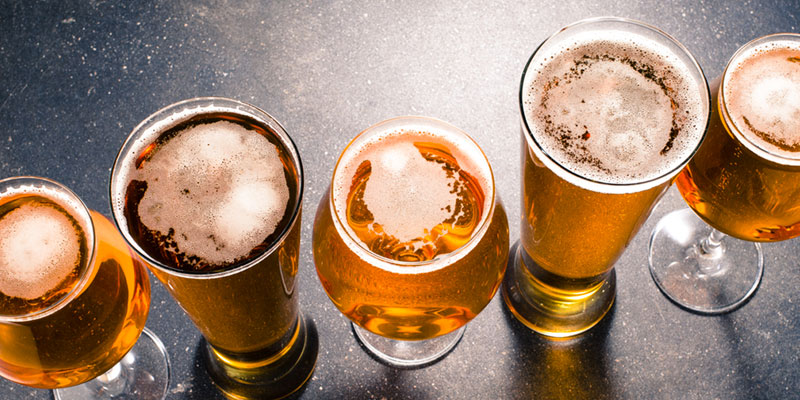
If you haven’t had a sip of beer in years because you think you don’t like it, it’s time to reconsider your next bar order. “Gone are the days of beer solely being commodified suds, each brand indiscernible from the next,” says Rich Higgins, a master cicerone and certified sommelier. Thanks to craft beer and authentic imports, today’s beers offer much more than what you think of as “beer.” “People who’ve sworn off pallid, industrial beer owe themselves a revisit to discover the flavors, aromas, textures, and food-pairing affinities of great beer,” Higgins says.
Start with these beers, which all feature flavors that might remind you of wine or spirits you love:
If you like: Riesling
Try: Gose
Pronounced “GO-zuh,” this German style of sour beer is experiencing a revival, Higgins says. With a refreshing, lemony tang, subtle citrusy spice, and briny minerality, fans of minerally, high-acid white wines like dry German Riesling and Sancerre may like this best, Higgins says. “Contemporary U.S. craft versions often have fruit or hibiscus too, adding further intrigue,” he adds.
If you like: Sauvignon Blanc
Try: Double IPA
This beer is very bitter. “However, this high bitterness is often balanced by honeyish malt richness, sweetness from high alcohol, and tons of hop aroma,” says Higgins, who recommends it for those who love ripe, aromatic white wines like southern Rhone whites, Falanghina, or California Sauvignon Blanc. “IPAs can be polarizing, but double IPAs, tend to be more balanced, complex, and malty, showing the softer side of IPA,” Higgins says.
If you like: Moscato
Try: Weissbier
If you like fruity, light, smooth white wines (think Moscato d’Asti or Pinot Blanc), try this German wheat beer. “The star of the show is the weissbier’s yeast, which creates flavors of banana, clove, vanilla, and sometimes orange in the beer,” Higgins says. Expect a smooth, bready mouthfeel. You may also see this listed as Bavarian hefeweizen, but if you see “American hefeweizen,” that’s not the same thing.
If you like: Champagne
Try: Saison
“Saisons are dry and refreshing, with spritzy carbonation and a slight tartness,” Higgins says. So they’re good for drinkers of dry, herbal, or spritzy white wines, like Champagne, Vinho Verde, and Grüner Veltliner, he says. Expect notes of lemon, capers, and black pepper on the nose with hints of dried thyme.
If you like: Burgundy
Try: Flanders red ale
“The Flanders red-style ale is the one to offer a red wine drinker who has tasted a wide range of beer styles and hasn’t yet found one that they enjoyed,” says Mirella Amato, master cicerone and author of “Beerology: Everything You Need to Know to Enjoy Beer…Even More.” Higgins says it’s especially good for those who like Pinot Noir or dry Oloroso Sherry. It has toasted notes and cherry flavors, so it’s called the Burgundy of Belgium, he adds.
If you like: Whiskey
Try: Vienna lager
According to Amato, it’s rare to find a whiskey drinker who doesn’t like beer. But if you’re one of those, reach for Vienna lager. “It’s a clean, simple style, with a flavor profile that features complex malt notes,” Amato says. “Craft-brewed examples have rich toasted grain notes, which are reminiscent of the flavors that barrel aging imparts to whiskey.”
If you like: Bourbon
Try: Bourbon-barrel-aged imperial stout
As you might expect, bourbon lovers may like this stout. You may also like it if you’re big on coffee and chocolate, Higgins says. “Imperial stouts are some of the richest, booziest beers around,” he says. “Many craft brewers marry these stouts’ flavors of dark chocolate and coffee with the caramel, vanilla, and oaky flavors of bourbon distillers’ freshly emptied bourbon barrels. Time in the oak softens the beer and lengthens its finish.”
If you like: Rum
Try: Barleywine or Belgian strong ale
Full-bodied, higher in alcohol, and with an underlying sweetness, these are the antithesis of golden lagers, Amato says. That sweetness is often appealing to people who like aged rums and port, she says.
If you like: Coffee
Try: Oatmeal stout
“It’s happened many times that wine drinkers who attend my workshops will be surprised by this style and very much enjoy it,” Amato says. “It’s likely that the oatmeal stout particularly appeals to those who enjoy dark chocolate or black coffee, because it is brewed with roasted malt that gives it the same rich, roasted flavors and aromas.”

